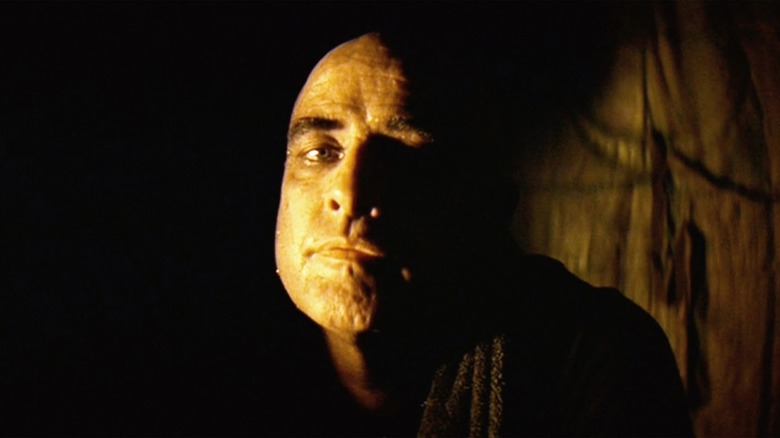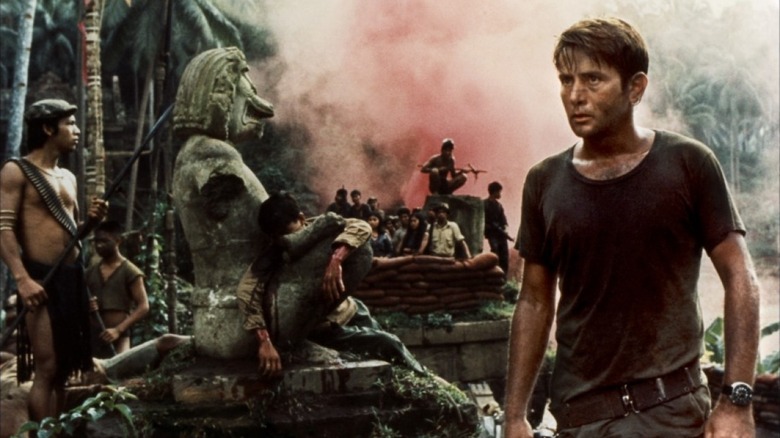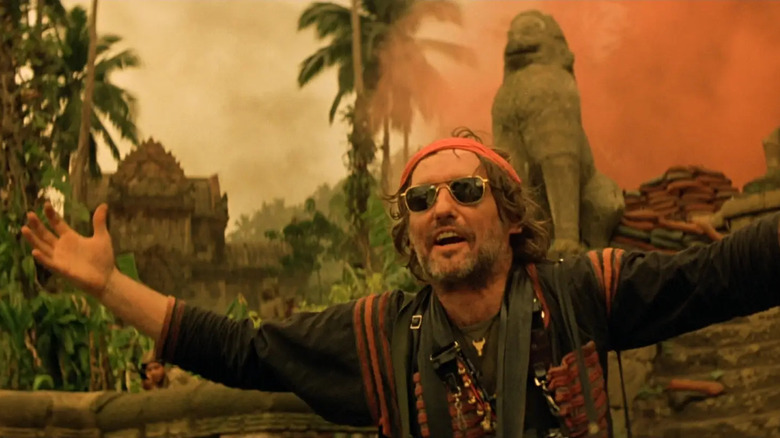Director George Lucas Made A Heroic Gesture To Save Apocalypse Now
In the 1970s, American films underwent a massive shift, thanks to a new generation of talent infiltrating the business. Filmmakers like Martin Scorsese, Steven Spielberg, and Brian De Palma introduced a new, more energetic language into films, largely thanks to their studious backgrounds studying movies and reading the essays of Jean-Luc Godard and François Truffaut; this generation of filmmakers is traditionally called the Film School Generation. These artists tended to look after each other, seemingly understanding their mutual unspoken goal of revolutionizing movies and exploring the limits of what the medium was capable of.
Two Film School Generation directors once entered an alliance one might not expect. Francis Ford Coppola had already won many, many Oscars for his "Godfather" movies and for "The Conversation," making him a legitimate Hollywood darling. George Lucas, meanwhile, rewrote the language of the Hollywood blockbuster with "Star Wars" in 1977. Aesthetically, the two filmmakers could not have been more different, with one interested in human tragedy or abstract panic, and the other keen on recapturing childlike exhilaration as one might encounter in a Saturday afternoon serial. In terms of their capabilities of shaking up the Hollywood system, however, the two filmmakers were certainly matched, and they admired each other.
In 1979, Lucas was gearing up to produce "The Empire Strikes Back," a sequel to "Star Wars," and Coppola had just completed his ambitious, semi-surreal Vietnam War epic "Apocalypse Now." The latter was a troubled, expensive production, and Coppola might have had to sell his wine property in Napa, California if it got too pricey to complete.
Luckily, Lucas was rich enough that he offered to buy "Apocalypse Now" and hold it for a decade, to protect it from being shut down. Coppola told the story in an interview with The Talks.
The horror, the horror...
It's worth noting that "Apocalypse Now," based on the Joseph Conrad novel "Heart of Darkness," was once only going to be produced by Coppola, with Lucas directing. Lucas dropped out of the project in the late 1960s, and Coppola took over, eager to make something that resembled Werner Herzog's amazing 1972 release "Aguirre, the Wrath of God," a film about 16th-century conquistadors dying in the jungle looking for El Dorado. Coppola's version of "Heart of Darkness" was to be just as bleak, and tinged with just as much madness.
Shooting "Apocalypse Now," however, was a massive trial. A typhoon hit the town in the Philippines where Coppola was shooting, causing production to shut down for a spell. The film's star, Martin Sheen, famously suffered a breakdown on set, and had a heart attack that nearly killed him. What's more, Marlon Brando arrived on set completely unprepared, causing delays. Coppola had to continue to raise funds for the film as it went further and further over budget. It ended up costing more than double its original price.
Recalling the time, Coppola said:
"Well, when your lead actor has a heart attack and no one knows if he is going to live or die, I would say that's a very serious moment. But that was only one of a lot, and the bankruptcy was very difficult. We were faced with potentially losing the Napa property, which was such a beautiful and important property to me."
Coppola owned a winery on that property that he founded in 1975. Coppola wines are still being made there to this day. It was important that he keep his business open.
This was when Lucas stepped in.
Lucas tried to help save Apocalypse Now
Lucas, of course, was rather wealthy at the time because of "Star Wars." Lucas famously optioned a portion of the film's merchandising, which, at the time, wasn't seen as a major revenue stream for a feature film; in the '70s, they were even called "garbage rights." But the toy sales for "Star Wars" surpassed anything ever seen before for a film tie-in, and Lucas made millions, so he was in a position to offer a little assistance to his fellow Film School Generation buddy. Lucas could afford to buy "Apocalypse Now," giving Coppola a financial leg-up, and then would wait a decade before returning it for the same price. Coppola said:
"He did offer to buy it, thereby protecting it, and would hold it for 10 years and then sell it back to me for the same thing, it basically was a gift to protect it. And in the end I didn't have to do that, I was able to figure out a way to survive. But the fact that he made that offer was very generous and, I mean, something that I would be grateful to him forever."
Coppola admired and respected Lucas, but did eventually admit that the success of "Star Wars" ruined Lucas as a filmmaker. Coppola felt Lucas was no longer an artist shaking up the system, but a representation of the system itself. There was, Coppola felt, a lot more cinematic experimentation that could be done.
In 2012, Lucas sold off "Star Wars" to Disney and now claims he is making experimental films again, although he never intends to show them to anyone. Coppola, meanwhile, is poised to take another big swing with his upcoming "Megalopolis."


